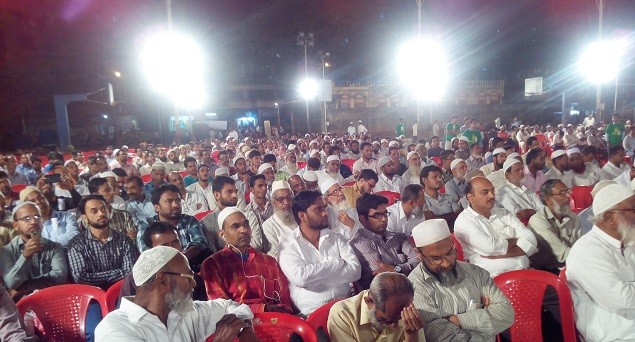By IndiaTomorrow.net,
Mumbai / New Delhi, 04 July 2015: The Maharashtra government is in the line of fire from the Muslim community for its move declaring madrasa students as out-of-school children. The state head of Jamaat-e-Islami Hind has even threatened to move the court if the government did not call back the ‘unconstitutional’ order.
The school education department of the state government is conducting a day-long state-wide survey today to get a headcount of the out-of-school children in the state. As part of the survey, the minority affairs department of the state has decided to count students of madrasas that do not offer subjects such as science and mathematics as ‘out-of-school’ children.
The government move has earned huge criticism from the Muslim community.
“The move of the government is completely unconstitutional and also runs contrary to its own gazette notification dated 20th June 2012 in which it had said that madrasa education will be considered school education under Right To Education law,” said Taufique Aslam Khan, state president of Jamaat-e-Islami Hind while talking to IndiaTomorrow.net over phone.
He also said that besides Jamaat, many other groups that are active in the field of education are also concerned with the decision of the government.
“Officials of our education cell are meeting concerned people, and if the government didn’t take back the order, we will move the court,” said Khan.
Eminent social activist and former Member of National Integration Council, Navaid Hamid raises some strong questions behind the move.
Talking to IndiaTomorrow.net, he asked: “What is the government doing for the basic education of Muslims? If Maharashtra government finds madrasa as a hindrance in the way of modern education, then why doesn’t it open primary or middle schools near the madrasas?
Hamid strikes hard at the motive behind the frequent targeting of madrasas.
“The foremost reason for attacking madrasas is that RSS and Sangh Parivar consider madrasas as an obstacle in the way of Hinduising the poor Muslims. Madrasas have just 4.5% of total school-going Muslim children, as per the Sachar Report, and they are from very poor and marginalized background. Madrasa education has played a significant role in enhancing literacy rate as the students learned language, basic mathematics and other social subjects besides Islamic studies.”
Mahmood Asim, a research scholar at Jawaharlal Nehru University in Delhi said: “Why so much focus on madrasas where only 4% of Muslim children are studying? Why doesn’t the government care much about the 96% Muslim children? There are hardly any madrasa which teaches only Arabic or Quran. They give all basic education up to middle school level.”
Asim who has studied at two renowned madrasas – Jamiatul Falah in Azamgarh and Nadatul Uloom in Lucknow – before moving to Jamia Millia Islamia in New Delhi for graduation in Arabic and JNU for masters has collected data on madrasa graduates studying at mainstream colleges and universities and some others working at MNCs and at embassies.
“As per my assessment, 90% of Muslim students in Jamia Millia, JNU, Delhi University and EFLU are from Madrasa background. What else Madrasas can produce? Please don’t poke nose in their business,” he said adding that a good number of madrasa graduates are working at MNCs and also at embassies in Delhi.
Mumbai-based social activist and journalist Rehan Ansari is of the view that madrasas should be allowed to reform from within, and nothing should be imposed from outside.
“Madrasa is a place for special kind of education where pupils are trained to teach Islam to Muslims and non-Muslims. Unfortunately it became the last resort for the poorest. Teaching them science and other subjects can be done but let them decide and don’t force upon them.
Other point is you cannot make everyone doctors and engineers or can’t say that they are the only literate ones. Lawyers and teachers are also required in the society. Likewise Ulema who have special knowledge of deen are also required.”





